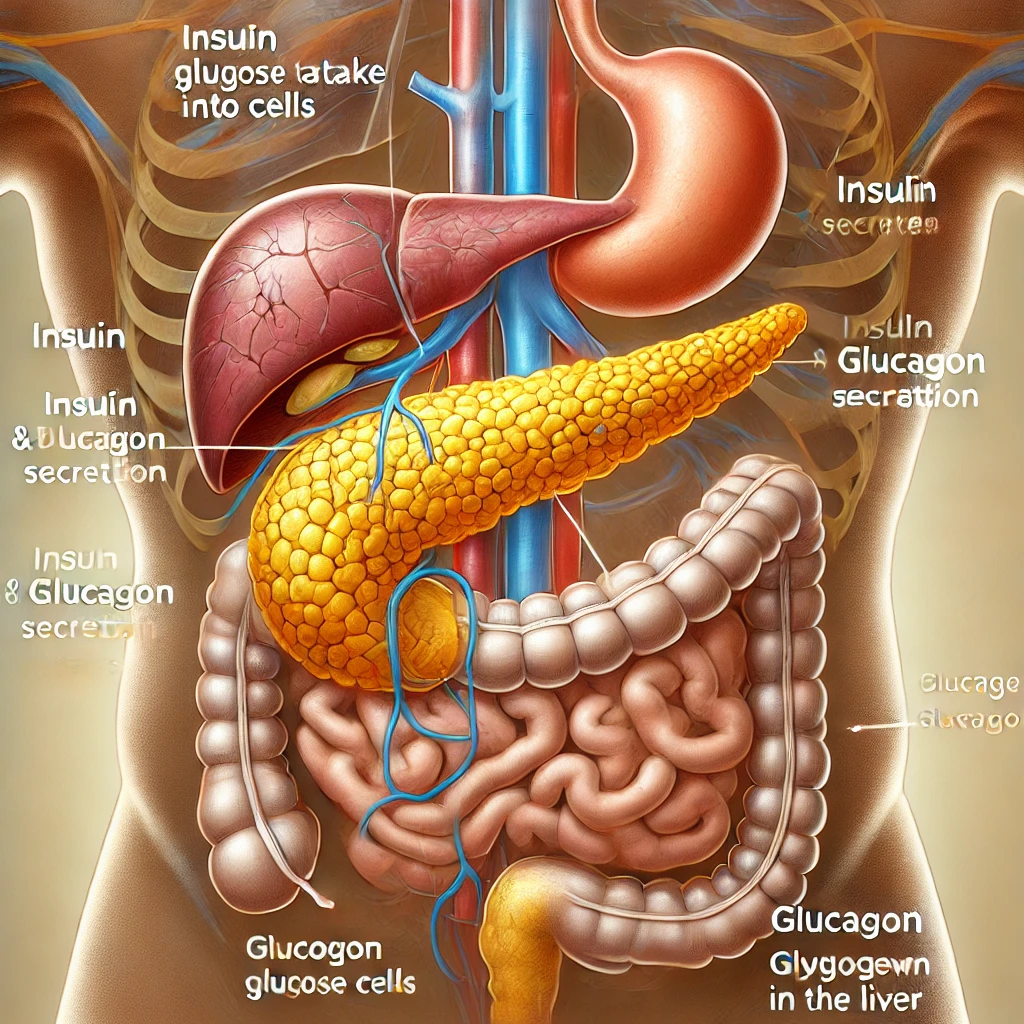The functioning of multicellular organisms is regulated by the nervous and endocrine systems, and the hormones insulin and glucagon in particular play an important role in maintaining energy balance by regulating blood sugar. Insulin lowers blood sugar and glucagon raises blood sugar, and their interaction maintains homeostasis in the body.
In multicellular organisms, the functions of the component cells are regulated by the nervous and endocrine systems. The nervous system responds quickly through nerve signals, while the endocrine system is responsible for slow but continuous regulation through hormones. The endocrine system works through hormones secreted by the endocrine glands. The glands that secrete hormones are both digestive and endocrine glands. There are more than a million small cell populations throughout the gland. These are called islets of Langerhans. The islets of Langerhans contain β-cells, which secrete insulin, and α-cells, which secrete glucagon.
The main action of insulin is to lower the concentration of glucose in the blood by facilitating the entry of glucose into cells. It also causes the liver to store glucose in the form of glycogen, increases protein synthesis in cells, and stimulates fat production. These processes play an important role in regulating your body’s energy metabolism and storage. For example, after a meal, glucose absorbed from food enters the blood and increases blood sugar levels. Insulin then moves the increased blood sugar into the cells, where it can be used as an energy source or stored for later use.

Glucagon, on the other hand, has the opposite effect of insulin, and its main action is to increase the concentration of glucose in the blood by breaking down glycogen stored in the liver into glucose. It also separates amino acids and fatty acids from their storage sites into the blood. Glucagon is primarily active in the fasting state, when it prompts the liver to release glucose to meet the body’s energy needs. For example, when you exercise or go without food for long periods of time, glucagon is essential to maintain energy balance in the body.
The secretion of insulin and glucagon is regulated by blood glucose levels. After eating, the amount of glucose in the blood, or glycemia, increases, which stimulates the β-cells to secrete more insulin. Insulin absorbs glucose from the blood and transports it into the cells, which leads to a decrease in blood glucose levels and therefore a decrease in insulin secretion. On the other hand, if a person hasn’t eaten for a long time, or if their blood glucose levels drop below 70 mg/dl, for example due to exercise, the α cells of the islets of Langerhans increase the amount of glucagon they secrete. Glucagon breaks down glycogen stored in the liver to make glucose, which is then sent into the blood. As a result, blood sugar levels rise again.
The importance of regulating blood sugar is seen in different parts of the body. For example, if you don’t maintain proper blood sugar levels, your brain doesn’t get enough glucose to fuel it, which can lead to dysfunction. In general, a blood sugar level of 99 mg/dl or less after fasting for at least eight hours is considered normal, and 126 mg/dl or more is considered diabetes. These criteria emphasize the importance of blood sugar control and show how insulin and glucagon interact to maintain homeostasis in the body.
Glucose is the brain’s primary energy source. The brain requires a steady supply of glucose throughout the day, and insulin and glucagon work in opposition to each other to keep this glucose concentration in a normal range. Therefore, when these two hormones are out of balance, a number of problems can occur throughout the body. For example, a lack or malfunction of insulin can lead to diabetes, which can cause long-term health problems. On the other hand, an overproduction of glucagon can cause hyperglycemia, which requires proper treatment and management.
In addition to insulin and glucagon, several other hormones are involved in blood sugar regulation. For example, cortisol, secreted by the adrenal glands, is responsible for raising blood sugar, which is especially important in stressful situations. Growth hormone also contributes to raising blood sugar, which is important for the body’s growth and development. These various hormones interact to maintain homeostasis in the body.
Understanding the mechanisms of blood sugar regulation provides an important basis for the treatment and management of metabolic diseases such as diabetes. Recent research is exploring drugs that increase insulin sensitivity, therapies that improve β-cell function, and new mechanisms of hormonal regulation. These studies are contributing to the development of more effective diabetes treatments and prevention strategies.
